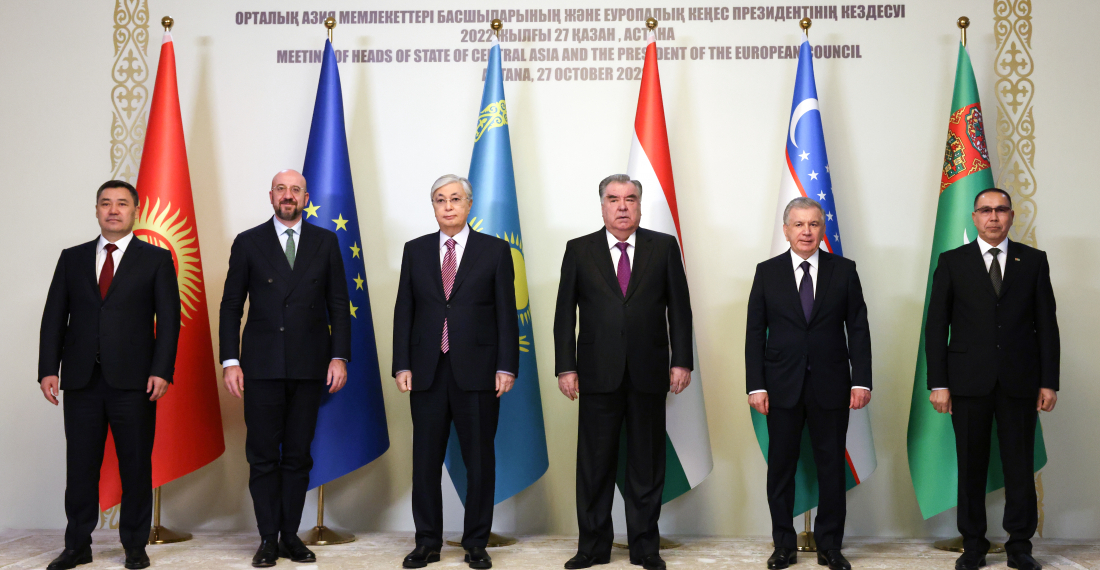On 27 October 2022, President of the Republic of Kazakhstan Kassym-Jomart Tokayev, President of the Kyrgyz Republic Sadyr Zhaparov, President of the Republic of Tajikistan Emomali Rahmon, President of the Republic of Uzbekistan Shavkat Mirziyoyev and President of Turkmenistan Serdar Berdimuhamedov (represented by Turkmenistan's Deputy Chair of the Cabinet of Ministers) and President of the European Council Charles Michel welcomed the first regional high-level meeting in Astana.
A joint statement issued after the historic meeting said that:
In an open and friendly atmosphere of mutual respect and trust, the participants summarized the past period of multifaceted and mutually beneficial cooperation between Central Asian states and the EU and reaffirmed their commitment to continue building a strong diversified and forward-looking partnership underpinned by shared values and mutual interests. They reaffirmed their commitment to work together for peace, security, democracy, rule of law and sustainable development in full respect for international law. They expressed continued commitment to uphold the UN Charter, particularly the principles of respect for the independence, sovereignty, territorial integrity of all countries., non-use of force or threat of its use and peaceful settlement of international disputes.
The statement added:
"In the 30 years since the establishment of diplomatic relations between Central Asian States and the EU, interregional cooperation has advanced in many areas and sectors and serves as an example of a multilateral partnership for prosperity and sustainability.
The Leaders confirmed the importance of strengthening dialogue on the rule of law, human rights, gender equality and the work of institutions, which are guiding principles for inter-regional cooperation in the framework of the EU Strategy for Central Asia of 17 June 2019.
Participants welcomed the institutionalization of the relationship between the Central Asian nations and the EU through the work of existing high-level platforms, and stressed the importance of active involvement of civil society in developing interregional cooperation.
The President of the European Council welcomed the efforts of Central Asian leaders to strengthen regional cooperation and connectivity as set out in the Joint Statements of the Consultative Meetings of Central Asian Heads of State.
In their turn, the Heads of State of Central Asia highly appreciated the EU's contribution to intensifying economic development after the pandemic, overcoming socio-economic challenges caused by COVID 19 and promoting cross-border cooperation in the region. Support and expansion of mutual trade and investment mechanisms gives a qualitative impetus to socio-economic development of all parties. Parties underlined that creation of favourable business environment would help to further boost investments in the region, connectivity and trade. In this context, parties welcomed the new EU-Central Asia Economic Forum platform.
The Participants expressed common concern over the situation in Afghanistan and recognized the need to expand interaction in providing humanitarian aid to the Afghan people. The Participants stressed the importance of the promotion of and respect for human rights and fundamental freedoms of all Afghans, in particular women, girls and minorities, and the establishment of an inclusive and representative government. In this context, the interim results of the EU-UNDP pilot project on the training of Afghan women at universities in Kazakhstan and Uzbekistan, as well as in the framework of the special education programmes in the Kyrgyz Republic, Tajikistan and Turkmenistan are significant. The initiatives are aimed at creating higher education opportunities for Afghan citizens and contribute to the inclusive socio-economic development of women into the Afghan society.
The leaders noted the positive outcome and potential of cooperation between Central Asia and the EU in border management and security, in the joint fight against terrorism, transnational organized crime, human trafficking, migrant smuggling, trafficking in small arms and light weapons, transnational drug trafficking and cybersecurity threats in accordance with universal principles.
Participants stressed the crucial importance of developing a regional vision of and cooperation in building sustainable connectivity between Central Asia and the EU, in line with the EU Global Gateway strategy and the national transport and transit development objectives of Central Asian countries.
Central Asian leaders welcomed the EU’s intention to facilitate development of sustainable transport, logistics and digital interconnectivity while respecting green development standards. The expected outcomes of the EU study on sustainable connectivity in Central Asia are important, as is the close cooperation between the parties to harmonize Central Asia and EU transport routes including with the Trans-European Transport Network (TEN-T). In this context, participants welcomed the EU-Central Asia Ministerial Conference on Connectivity planned for November 2022.
The participants expressed their interest in strengthening joint actions in the field of “green development”, environmental protection and climate change in accordance with the Paris commitments of the parties. Taking into account the positive experience of the EU in developing and implementing mechanisms for joint management of water resources and transboundary rivers, the participants discussed options for strengthening inter-regional cooperation in the implementation of innovative, mutually beneficial and open water-energy partnership in Central Asia. The parties note the importance of strengthening the expert and analytical interaction between think tanks of the two regions in order to develop joint approaches to common challenges.
The participants expressed their deep gratitude to Kazakhstan for initiating and hosting the first meeting of the Heads of State of Central Asia and the EU and agreed to meet regularly."







